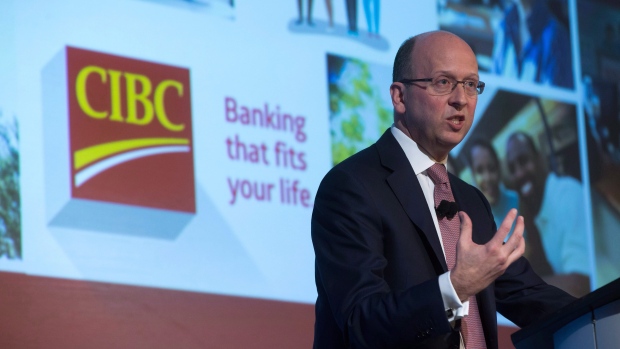Dec 7, 2016
CIBC CEO Victor Dodig faces defining decision: Hold, walk or pay up for PrivateBancorp
By Paul Bagnell

“Deal is pricey in our view.”
“Could put dividend increases on hold.”
“Somewhat pricey and near-term dilutive to earnings.”
So chirped analysts on June 29, when Canadian Imperial Bank of Commerce (CM.TO) announced the biggest acquisition in its history: the $4.9-billion deal to buy PrivateBancorp of Chicago (PVTB.O). The clear consensus: CIBC had chosen wisely after years of looking for a U.S. bank to buy and build upon -- but the purchase price was was steep.
Well, it’s likely about to get a whole lot more expensive, if it happens at all.
After a big surge in U.S. regional bank share prices since the U.S. election, CIBC’s offer is no longer competitive. PrivateBancorp’s shares are trading at prices higher than CIBC’s offer. Three shareholder advisory services – as able to do simple math as anyone – have recommended PrivateBancorp shareholders vote against the deal. On Wednesday, PrivateBancorp scuttled the shareholder vote that has been set for tomorrow, bumping it to a yet-to-be-determined date in the first quarter. In a sign of how quickly things can change, its decision to postpone was announced less than 24 hours after a Bancorp spokesperson told BNN the meeting would proceed as planned.
CIBC has offered US$18.00 in cash and 0.3657 of a CIBC share for each share of PrivateBancorp. At Tuesday’s closing prices, the offer was worth US$48.94. PrivateBancorp stock closed Tuesday at US$52.14.
- PrivateBancorp postpones vote on CIBC's US$4B takeover to 2017
- CIBC may need to sweeten US$4B deal for PrivateBancorp: Analyst
- CIBC stands firm on US$4B PrivateBancorp takeover bid despite calls to raise offer
MORE ON THE DEAL
CIBC CEO Victor Dodig and his team must now be furiously crunching the numbers on a higher offer for PrivateBancorp. It can’t be easy.
At 18 times PrivateBancorp’s expected earnings and 2.2 times its book value, CIBC had agreed to a deal that would not add to CIBC’s profit for three years. It would mean CIBC’s peer-leading capital levels would drop to peer-lagging levels, almost certainly slowing the likely pace of dividend increases.
How much more of that can CIBC ask of its shareholders?
On the other hand, how can CIBC now walk away from a U.S. beachhead that was widely seen as the right choice?
CIBC’s strategy was to make what Dodig called a “foundational” acquisition in the United States, then to build on that base with smaller acquisitions in the future. CIBC aimed to drive profit from the U.S. to about 20 per cent of its total earnings – up from five per cent right now. And CIBC’s Canadian customers would benefit immediately by getting access to banking south of the border.
“That’s exactly what he needs to do, ” National Bank Financial Analyst Peter Routledge told me Wednesday morning on The Street.
CIBC’s search for a U.S. takeover target led it to PrivateBancorp, a Chicago-based lender to small- and medium-sized businesses and – significantly – a provider of fee-based wealth management services. (In 2014, CIBC bought Atlantic Trust, a wealth management provider to high-net worth individuals.)
PrivateBancorp does business under the name The Private Bank and operates in Chicago and 11 other cities, mainly in the U.S. Midwest. And it competes successfully in those markets. Between 2007 and 2015, it delivered compound annual loan growth of 16 per cent.
All that, Dodig must have reasoned in the spring, made paying up for PrivateBancorp a wise move. CIBC’s offer was priced at a 30 per cent premium to valuations of other U.S. regional bank stocks.
Then Donald Trump won the U.S. Presidential election.
Investors immediately reset their expectations, raising the market’s forecast on U.S. economic growth and betting that bank regulation will ease under a Trump White House and Republican Congress. Bank shares soared. The S&P Regional Banks index jumped 23 per cent between election day and December 6. Shares of PrivateBancorp – which had already received a big boost in June when the deal with CIBC was announced – climbed 15 per cent between November 8 and December 6. CIBC shares are up 10 per cent over that period.
The offer that came at such a rich premium on June 29 was now worth less than the amount investors were swapping PrivateBancorp shares for on the open market.
“I thought it was a great strategy,” Routledge told me. “I still think it’s a great strategy. It just got a little more expensive.”



